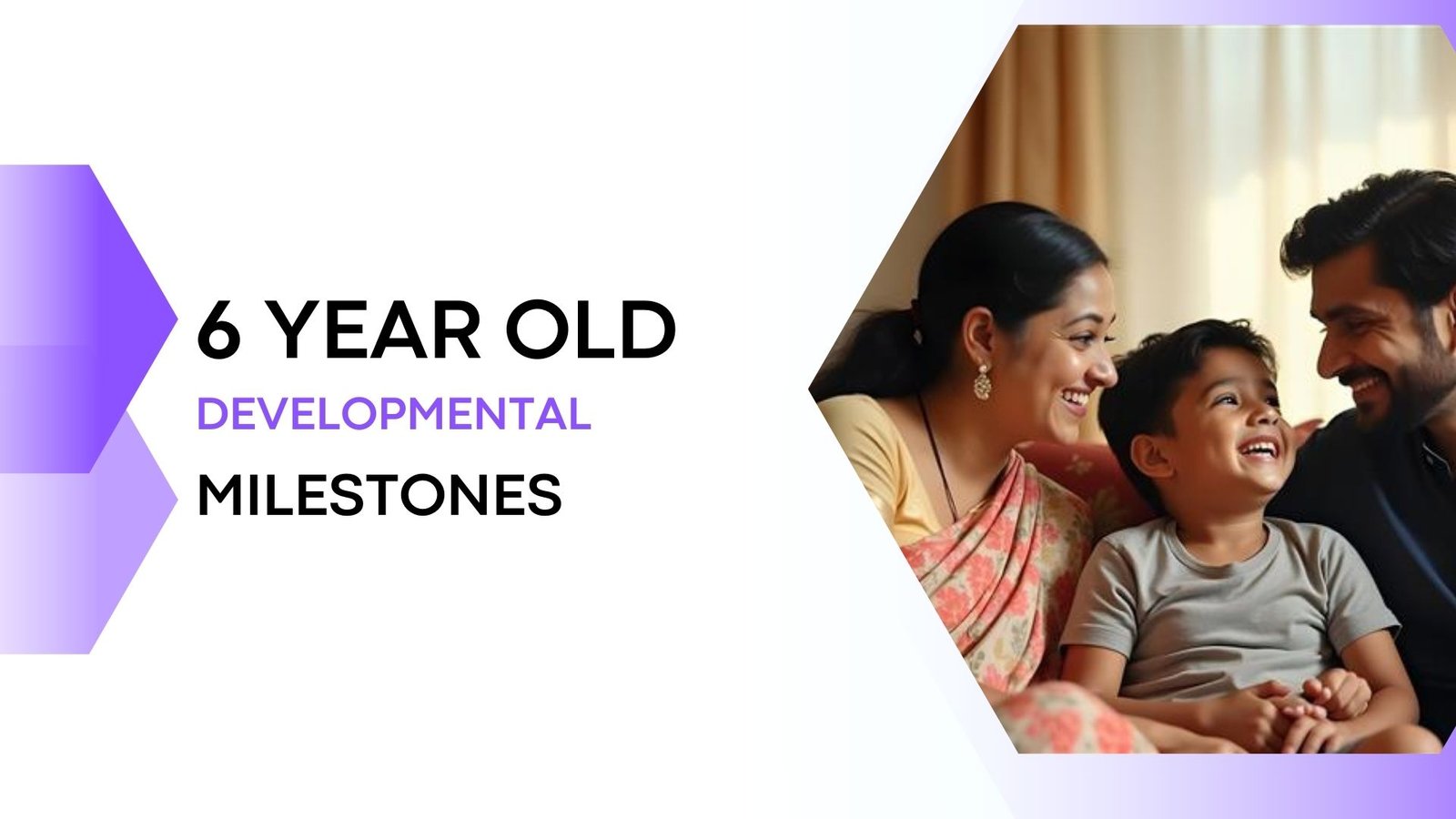As your child turns six, you may start noticing major changes in the way they move, think, behave, and communicate. This is a special age—full of curiosity, independence, learning, and emotions. Understanding 6 year old developmental milestones helps you track your child’s growth and know what’s typical for their age.
Every child grows differently, but there are certain skills most six-year-olds develop around this stage. These milestones help you understand how your child is progressing in physical growth, emotional maturity, social skills, language development, and reasoning ability.
This comprehensive guide walks you through everything parents should know about 6 year old developmental milestones—in a simple, clear, and helpful way.
Simplify parenting with our app.
Click on This Link

Why Developmental Milestones Matter at Age Six?
Six is an important transition year. Most children begin formal schooling, meet new friends, manage early responsibilities, and start showing a strong sense of self. Tracking 6 year old developmental milestones helps you:
- Understand your child’s strengths
- Identify areas that may need support
- Communicate better with teachers
- Encourage healthy habits
- Intervene early if delays are present
Milestones are not tests—they’re helpful guidelines that show how your child is growing.
Cognitive Milestones for 6-Year-Olds
At this age, your child’s thinking becomes sharper, more logical, and more curious. They start connecting ideas, solving problems, and exploring how things work. Key cognitive 6 year old developmental milestones include:
1. Improved problem-solving
Your child can now understand simple logic, complete puzzles, and follow multiple steps.
2. Understanding sequences
They know what comes first, next, and last—useful for routines and school activities.
3. Early math skills
Most six-year-olds can:
- Count to 100
- Add or subtract small numbers
- Recognize shapes
- Understand time concepts like “yesterday” and “tomorrow”
4. Longer attention span
They can focus for 10–15 minutes on one activity—great for school readiness.
5. Curious questions
Expect lots of “Why?”, “How?”, and “What if?”—this shows a strong desire to learn.
These cognitive year old developmental milestones help children build confidence in learning, especially during the first years of school.
Language and Communication Milestones
At six, communication becomes more advanced. Children speak more clearly, understand more words, and express their thoughts well. Important language 6 year old developmental milestones include:
1. Speaking in full sentences
Six-year-olds can form long, detailed sentences to explain thoughts.
2. Vocabulary boost
They understand and use 2,500–3,000 words and are learning new ones daily.
3. Telling stories
Whether real or imaginative, they enjoy sharing stories with a proper sequence.
4. Understanding grammar
Most children understand plurals, tenses, and basic grammar rules.
5. Reading and writing beginnings
Many six-year-olds can:
- Recognize letters
- Read simple words
- Write their name
- Copy short sentences
These communication 6 year old developmental milestones help your child succeed in school and social interactions.
Physical Development Milestones
Physical skills grow in two major areas: gross motor (large body movements) and fine motor (small muscle control).
1. Gross Motor Milestones
Most six-year-olds can:
- Run with better coordination
- Hop, skip, and jump confidently
- Balance on one foot
- Ride a bicycle (with or without support)
- Kick and throw balls accurately
- Show better stamina during physical play
These milestones help them participate in games, sports, and school activities.
2. Fine Motor Milestones
Six-year-olds show improved control over small hand movements. They can:
- Write neatly
- Use scissors properly
- Tie shoelaces
- Draw shapes or simple pictures
- Build complex block structures
Fine motor 6 year old developmental milestones help with writing, drawing, dressing, and self-care.
Social and Emotional Milestones
This is the age when social understanding grows rapidly. Children begin forming deeper friendships and expressing more advanced emotions. Key social-emotional 6 year old developmental milestones include:
1. Making close friends
Children begin having best friends and understanding loyalty.
2. Understanding rules
They follow rules more consistently and understand consequences.
3. Expressing feelings better
They can express emotions such as disappointment, excitement, and frustration.
4. Developing independence
Six-year-olds often want to do things by themselves, such as dressing or choosing their own clothes.
5. Handling conflict
They start learning how to solve simple disagreements with peers.
6. Growing empathy
Your child begins to understand how others feel and respond with kindness.
These milestones help children adjust to school and social environments.
Behavioral Milestones
Behavior becomes more structured as children learn discipline, responsibility, and self-control. Typical behavioral 6 year old developmental milestones include:
- Following routines independently
- Understanding right vs. wrong
- Showing responsibility with simple tasks
- Expressing clear likes and dislikes
- Managing small frustrations
- Listening and following instructions
Your child is becoming more reliable, responsible, and mature.
Self-Care Milestones
These are skills children need to manage themselves without adult involvement. Essential self-care 6 year old developmental milestones:
- Dressing without help
- Brushing teeth properly
- Washing hands
- Using the toilet independently
- Packing their school bag
- Eating meals neatly
- Keeping personal items organized
These skills build confidence and independence.
When to Be Concerned?
Every child grows differently, but talk to a pediatrician if your child:
- Cannot follow simple instructions
- Has unclear speech
- Struggles to make friends
- Shows extreme anger or fear
- Cannot hold a pencil properly
- Avoids physical activity
- Cannot recognize letters or numbers
- Has difficulty expressing emotions
Early support helps children reach their full potential.
How Parents Can Support 6-Year-Old Development?
Simple daily activities can help your child meet their 6 year old developmental milestones:
Cognitive Support
- Solve puzzles
- Read together
- Encourage questions
- Practice counting and shapes
Physical Development
- Outdoor play
- Cycling
- Running and jumping games
Language Development
- Storytelling
- Word games
- Reading aloud
Social-Emotional Support
- Playdates
- Role-play games
- Teaching sharing and kindness
Behavioral Growth
- Consistent routines
- Reward positive behavior
- Clear expectations
Your involvement plays a big role in helping your child grow strong and confident.
How Can KidsCur Help?
Understanding 6 year old developmental milestones helps parents support their child with confidence. Age six is full of new experiences—school, friendships, independence, and big learning moments. While milestones guide you on what’s typical, remember that every child grows at their own pace.
Celebrate your child’s unique strengths, encourage new skills, and reach out to a pediatrician if you have concerns. With the right support, six can be a joyful and transformative stage in your child’s life.
KidsCur makes milestone tracking simple, accurate, and stress-free for parents. Instead of guessing whether your child is growing as expected, the app gives you clear guidance with easy-to-understand progress insights. Download the app for now to avail its features!

